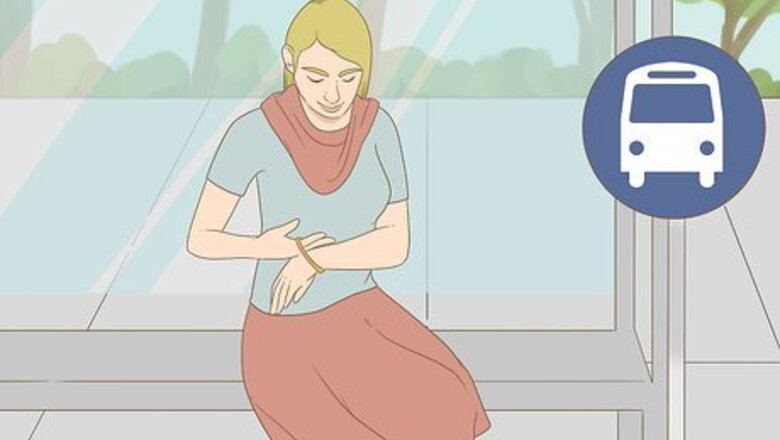
views
Resisting the Urge to Touch Your Face
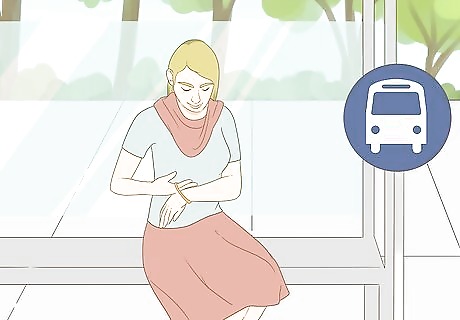
Keep your hands busy when you’re most likely to touch your face. If you’re likely to touch your face while you’re waiting for the bus, bored, or in class, give yourself a small fidget to keep your hands occupied. A stress ball, keychain, beaded bracelet, rubber band, or gemstone make great fidgets. If you touch your face while you’re watching television, give yourself a hand massage instead. Knitting or doodling are great ways to keep your hands engaged (plus you’ll be doing something creative!). Identify your triggers to help you anticipate temptation and plan distractions. Do you unconsciously touch your face while you’re reading, sitting in class, or watching television? Do you go the bathroom to brush your teeth and end up picking afterward? Or do you touch your face when you’re stressed, excited, angry, bored, or sad? You don't want to remove this habit completely if you're using it as a coping mechanism. Instead, try replacing the habit with something else.
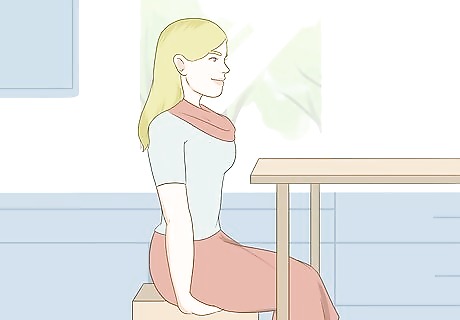
Sit on your hands if you’re tempted to touch or pick while you’re sitting. Whether you’re sitting in class or at the dinner table, try sitting on your hands when you’re not using them to eat or take notes. Designating a place for your hands to be (other than your face) will help you break the habit, especially if you touch or pick your face absentmindedly. As an alternative, lace your fingers together and set them on your lap or the table instead of leaning your face in your hands. Removing your ability to do the bad habit is a great strategy.

Post visual reminders to not touch your face or pick. Place sticky notes that say "NO TOUCHING OR PICKING" on your bathroom mirror, the visor mirror in your car, the TV remote, or anywhere else where you’re likely to see it. It helps to post these reminders in locations where you’re tempted to touch or pick at your face. You can even set hourly alarms on your phone to remind you to not pick if you’re prone to do so at certain times of the day.
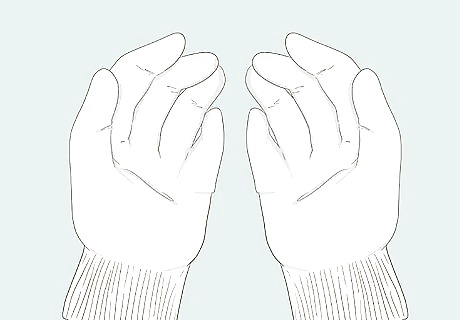
Wear gloves around the house if you tend to pick while you’re at home. It may sound silly, but it will be impossible to pick your face while wearing gloves. You can wear them overnight, too, if you tend to sleep with your face on your hands. Just be sure to wash the gloves regularly so they don’t collect bacteria. Use 100% cotton gloves. Wool will irritate your face (should you try to touch it) and nylon might get a runner. If wearing gloves isn't an option, consider placing bandages or narrow strips of tape over your fingertips. This is a bit more discreet, and will make it very difficult to pick your skin.
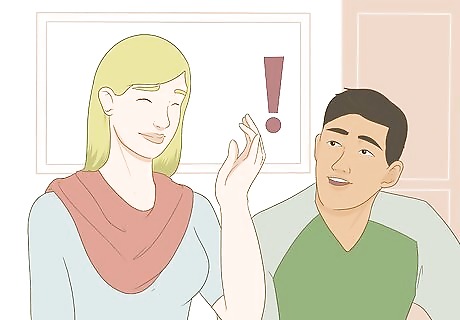
Ask a friend or family member to call you out whenever you touch your face. A close friend, parent, or roommate can be a very valuable ally when it comes to breaking the habit of touching or picking your face. Ask them to gently scold you if they see you touching your face. You can also create a collection jar, if necessary, to give you an incentive to avoid touching or picking. For instance, every time you do it, you have to put a dollar into the jar.

Remind yourself of reasons to stop touching or picking your face. Try not to become discouraged and remind yourself of all the good reasons for breaking the habit. Alternatively, you can remind yourself of the damage of touching and picking your face. Do an image search for acne scars to see what you may be in for if you continue to pick your face. Most types of acne will not cause scars if left untouched—picking, gouging, and irritating the skin is more likely to cause scarring.

Do mindfulness meditation to manage your emotional triggers. If you touch your face or pick when you’re feeling stressed, anxious, bored, or sad, take some time to clear and “reset” your mind. Meditation has been proven to help people manage their emotions and resist acting on body focused repetitive behaviors (like touching or picking). Follow online guided meditation videos or sign up for meditation classes at a local yoga studio. You can also download a guided meditation phone app like Headspace or MindShift to help you chill out while you’re on the go.
Minimizing the Damage to Your Skin

Clip your fingernails short and keep them clean. Make sure your fingernails are always clipped so you won’t cause damage to your skin should you decide to pick your face. Keeping the areas under your nails free of grime is also important to cut down on bacteria that might be transferred from your hands to your face. Hands are one of the dirtiest parts of the human body, so remind yourself of that as a deterrent!
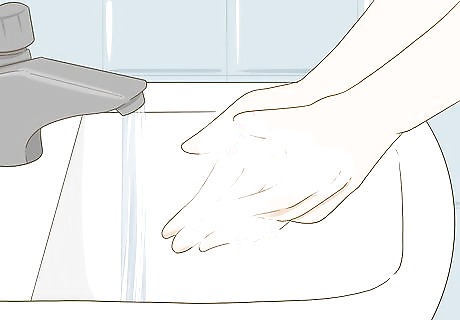
Wash your hands and fingers thoroughly with an antibacterial soap. Wash your hands with a pump or two of antibacterial soap and warm water. Rub your hands together for at least 30 seconds until they get sudsy before rinsing them with warm or hot water. Keeping your hands and fingers clean will make it less likely that you’ll get acne if you do end up touching your face. If you must touch your face, wash your hands before and after with antibacterial soap.
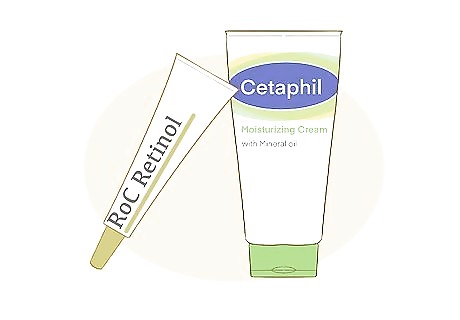
Follow a skincare routine to treat acne, if necessary. Talk to your doctor or see a dermatologist about getting prescription acne washes and creams if your acne is a trigger for you. Over-the-counter products containing salicylic acid, glycolic acid, benzoyl peroxide, and retinoids have all been shown to improve acne. For a natural option, consider using witch hazel and tea tree oil to dry up pimples and acne. When you wash your face, don't scrub too hard because it could cause irritation and tempt you to touch or pick the pain away. Remember, the more you touch your face, the greater chance there is of developing clogged pores, pimples, and acne.
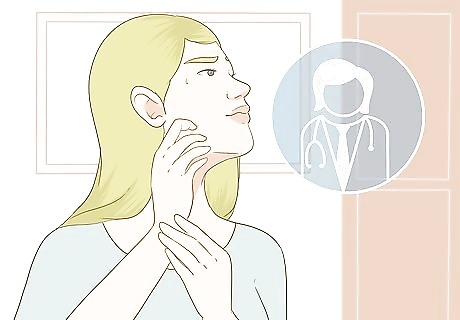
See your doctor if you suspect you have skin picking disorder (SPD). SPD is closely related to obsessive-compulsive disorder (OCD) and may call for cognitive behavioral therapy to help you recover. You may have SPD if you: Can't stop picking your skin. Pick your skin to the point that you cause cuts, bleeding, or bruising. Pick bumps, spots, or scars on your skin in an attempt to "fix" them. Don’t realize you're picking your skin. Pick your skin in your sleep. Pick your skin when you're feeling stressed out or anxious. Use tweezers, pins, or scissors (in addition to your fingers) to pick at your skin.












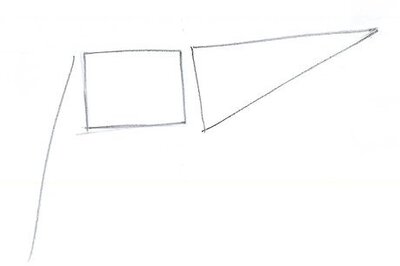

Comments
0 comment